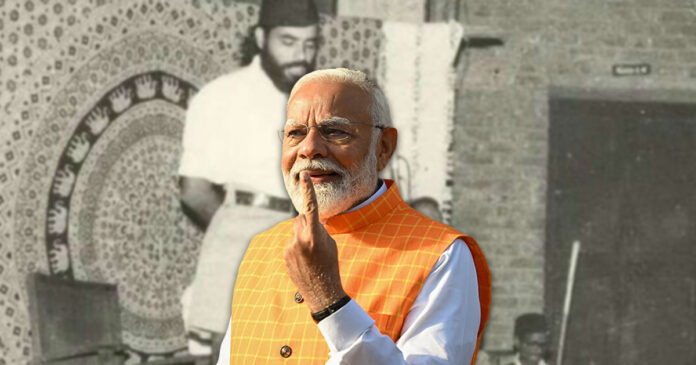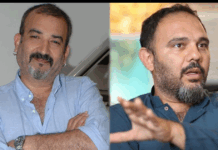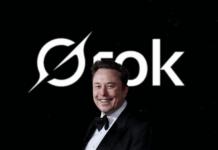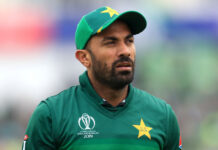
“The butcher of Gujarat lives, and he is the prime minister of India”
These were the words of the foreign minister of Pakistan, Bilawal Bhutto, as he addressed the UN Security Council back in 2022. This response was about the Gujarat massacre of 2002 and Modi’s association with the Indian RSS.
Back in the day, Bilawal Bhutto Zardari’s claims were overlooked. But today, as we face the horrific consequences of Modi’s fascist regime — we can’t help but wonder if perhaps our foreign minister was trying to warn us.
Bilawal Bhutto Called Modi the “Butcher of Gujarat”
“The butcher of Gujarat lives, and he is the prime minister of India,” Foreign Minister Bilawal Bhutto-Zardari told a UN briefing room minutes after his Indian counterpart accused Pakistan of perpetuating terrorism and sheltering Osama bin Laden. “I would like to remind Mr Jaishankar that Osama bin Laden is dead, but the butcher of Gujarat lives, and he is the prime minister (of India),” said the Pakistani foreign minister while responding to Indian Minister of Foreign Affairs S. Jaishankar’s remarks.
“He (Narendra Modi) was banned from entering this country (the United States). These are the prime minister and foreign minister of RSS, which draws inspiration from Hitler’s SS,” he added.
The irony of it all is that Modi has always been portrayed as just a normal “tea seller” and almost no one knows his actual reality. His association with the RSS and how he has strategically forged all these lies to keep himself in power has always been hidden.
Read More: Pak-India War: Like Cowards Do, India Launched Mid-Night Attack on Pakistan, Killing Civilians
This brings up one question: Did Modi have some association with the Pahalgam attack? Possible. The breach of security and orchestration of all the events that followed, including almost immediately pointing the finger at Pakistan. Without any impartial investigation being carried out.
Why the ‘Butcher of Gujarat?’ The Gujarat Massacre
The phrase “Butcher of Gujarat” is not mere hyperbole. It is a moral indictment that continues to shadow Prime Minister Narendra Modi more than two decades after the 2002 Gujarat riots. In the wake of the Godhra train fire that killed 59 Hindu pilgrims, a genocidal wave of communal violence engulfed Gujarat under Modi’s watch as Chief Minister. Over 1,000 Muslims people were massacred, women raped.
Reports from Human Rights Watch and Amnesty International revealed shocking details, including that the police and government officials did little to stop the violence. Modi, who was the minister of the state, was accused of ignoring the cries for help, or worse, silently supporting the mob attacks. Desperate victims called the police, but many were turned away or ignored. These were not random riots. They were organised attacks, allowed to continue by a government that had already picked its targets.
Though India’s Supreme Court eventually absolved Modi of personal involvement, the question of moral and administrative responsibility remains unresolved in the eyes of many observers, especially outside India.
The Western World Retaliated
After the riots, some Western countries did take a stand. The United States refused to give Modi a visa in 2005 because of his role in the violence. The United Kingdom also cut off all diplomatic contact. These moves showed the world had not forgotten about Gujarat, but that changed quickly. When Modi became Prime Minister in 2014, economic and strategic interests became more important than justice. The US and UK welcomed him warmly, rolled out red carpets, and praised him for his economic ideas. No one talked about the bloodshed in Gujarat. The voices of the victims were silenced by the sound of applause in foreign capitals.
A democratically elected leader may have been legally exonerated, but the ethical stain lingers. That stain is only deepened by the ideological roots from which he emerged.
The RSS: The Ideological Cradle of Modi
To understand Narendra Modi is to understand the Rashtriya Swayamsevak Sangh (RSS). It is a hardline Hindu nationalist organisation that has functioned as the ideological mother ship for the Bharatiya Janata Party (BJP) and many of its leaders. Founded in 1925 by K.B. Hedgewar, the RSS champions the concept of “Hindutva”; an exclusivist vision of Indian identity rooted in Hindu culture and tradition.
From its early days, the RSS has been accused of drawing inspiration from fascist ideologies. Historical writings by key RSS figures praised Hitler’s methods of “national rejuvenation,” despite the obvious racial and religious atrocities attached to that history. The organisation’s goal has never been hidden: to establish a Hindu Rashtra (Hindu Nation), in which minorities (especially Muslims and Christians) would live as subordinate citizens.
Modi joined the RSS at the age of 8. He grew up steeped in its militant discipline, ideological rigidity and combative nationalism. He never attended college in the traditional sense and instead spent his formative years training in RSS shakhas (branches). Eventually, Modi became a full-time pracharak (campaigner) before transitioning into politics under the BJP’s umbrella.
A Regional Voice Against Modi’s Nationalism
Bhutto’s comments were more than rhetorical provocation. It was a stark reminder that Modi’s past is still a live issue in South Asia’s diplomatic theatre. The phrase “Butcher of Gujarat” was a piercing return of international focus on the 2002 riots—an event that India’s ruling party has long attempted to put behind it.
The confrontation didn’t end there. In early 2024, following Indian strikes allegedly targeting terrorist infrastructure inside Pakistan, Bhutto again lashed out during an interview with Pakistani media. Without mincing words, he accused the Indian government of acting recklessly to shore up domestic political capital before elections, saying:
“India wants to create a war hysteria. Every time an election nears, they resort to aggression or jingoism to distract their own population from issues of inflation, joblessness, and intolerance.”
He further warned that India’s actions could destabilise the region and urged international powers to intervene diplomatically to prevent escalation.
Bhutto’s comments reflect a broader concern among India’s neighbours and global observers: that Modi’s aggressive nationalism and authoritarian tendencies are not merely domestic matters but pose wider geopolitical risks. For critics, India under Modi is not just a challenge to secularism at home—but to peace in the region.
Modi’s Regime: A Cult
Modi’s political persona is not just the product of careful PR: it’s an extension of the RSS ideal of masculine Hindu strength. He projects authority, austerity and an almost extremist perspective to the nation of India. The media portrayal of Modi often borders on mythmaking: he is portrayed as incorruptible, tireless and above criticism.
This deification serves a purpose. It is a model strikingly familiar to authoritarian regimes — strongman politics cloaked in democratic legitimacy.
India’s Secular Soul on the Brink
Narendra Modi’s RSS-backed rule represents a fundamental reimagining of India. It is not the secular, pluralistic nation envisioned by the framers of the Constitution, but as a Hindu-first policy where minorities exist by sufferance, not by right. The consequences are already visible especially amid the current India-Pak war situation. Extremist nationalism is boasted to an extent where the Indian masses no longer think that killing an innocent three year old is a war crime.
However, they must also remember that history, unlike politics, is less forgiving. And the world will remember. The nation of Pakistan will remember. And as said by our foreign minister, we will not kneel.
Stay tuned to Brandsynario for latest news and updates































